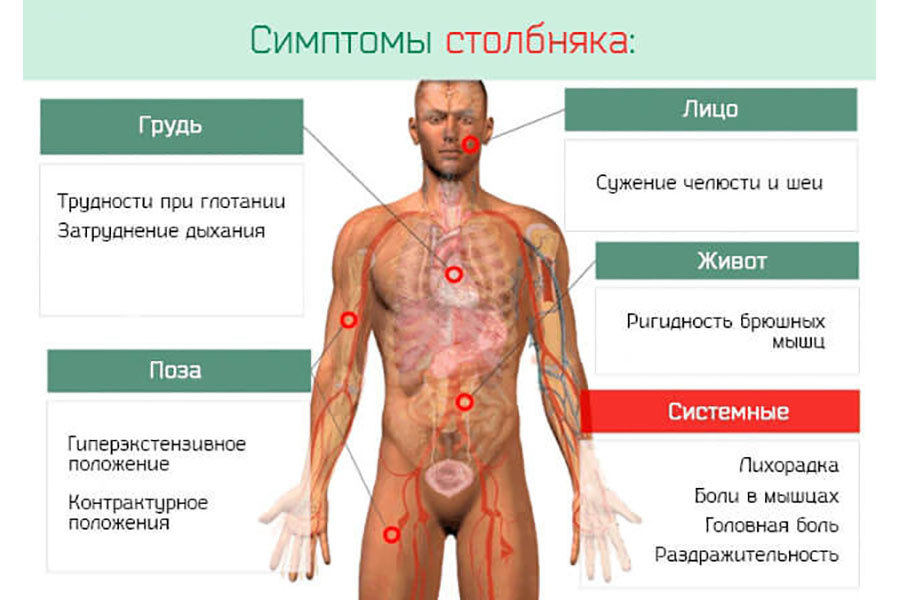What is tetanus and how to protect yourself and your loved ones from a tetanus infection?
Content
- Vaccination against tetanus: What is tetanus?
- Vaccination against tetanus: the geographical spread of tetanus and ways to get infected
- Vaccination against tetanus: Rules for conducting, selection of serum - when, where and how many times in life do children, adults make?
- Vaccination against tetanus: side effects and contraindications
- Vaccination against tetanus: compatibility of vaccination with alcohol
- Video: The most dangerous infections. Tetanus
Tetanus is one of the most common dangerous infectious diseases, which, in the absence of emergency care, leads to death almost in 80% cases. It was such a high percentage of death with a tetanus disease that prompted doctors of the whole world to resort to the practice of patient vaccination, which, in turn, reduces the risk of tetanus to a minimum.
However, not everyone is familiar with the rules for vaccination of children and adults, how many times in a life it is worth spending, at what age, as well as with contraindications, side effects and other vaccination features. In our article, we will try to give comprehensive answers to all these questions.

Vaccination against tetanus: What is tetanus?
- The tetanus refers to infectious diseases of a serious form, which affects the nervous system and causes strong convulsions, which often lead to cardiac arrest, paralysis of the respiratory tract and, as a result, to a painful fatal outcome.
- The causative agent of this disease is the bacterium of the genus Clostride ( lat. Clostridium tetani), better known among the people, as a tetanus wand. This bacterium, as a rule, selects an environment devoid of oxygen for its habitat, since this gas is destructive for it. However, thanks to their ability to form disputes, tetanus sticks learned to survive not only in the open air, but also at abnormal temperatures. But, it is only worth the bacteria to get into a favorable environment for it, for example, into a deep cut or wound, it will immediately move from a spore state to an active one.

- Disputes of tetanus sticks are most often found in the ground, in rivers and lakes, in excrement of animals, in dusty rooms, and even some of them can be present in the stomach and intestines of a person. However, having hit the human stomach, they will not pose threats to his health, since the gastrointestinal tract will simply not absorb them. The bacterium can cause harm irreparable to the body only when it gets deep enough into the wound, where there is no oxygen and where it can move from a spore state to active. To prevent this transition, and vaccination against tetanus is needed.
Vaccination against tetanus: the geographical spread of tetanus and ways to get infected
- The tetanus stick is common all over the world. However, the highest concentration of bacteria in a spore state is recorded in the soil and water bodies of tropical countries, whose climate is extremely warm and humid. The mortality rate from tetanus in such countries is the highest in the world. According to statistics, annually from tetanus dies more 90 000 Man and 80% From this amount it falls on hot countries with a wet climate and a poor living standards of the population. These include the countries of Africa, Latin America and some countries of Asia.
- Hot countries with a higher level of development and life, for example, Australia, introduced mandatory vaccination from tetanus for the population. Such measures helped reduce the percentage of mortality from tetanus in the country almost to zero.

As for the ways of infection with tetanus, it has already been said that it is necessary to get a bacteria into an open or filed wound, which should be deep enough for a comfortable “living” of the bacteria. Although, there were times when people became infected with tetanus from shallow scratches and burns. The following groups of people are most often subjected to this disease:
- Children (most often boys) from 7 to 10 years due to constantly broken knees and other injuries;
- Infants, whose immunity is completely weak and any scratch can lead to infection with tetanus;
- Adults actively engaged in physical labor and often receive industrial injuries (this is especially true for farmers and people of other professions with tight contact with the soil);
- Any persons who love to walk barefoot on the grass in the summer (it is in the summer that the highest percentage of tetanus is recorded);
All these categories need vaccination from tetanus.
Vaccination against tetanus: Rules for conducting, selection of serum - when, where and how many times in life do children, adults make?
Tetanus is very difficult to treat and, in case of infection with it, a fatal outcome occurs in 80% cases in adults and almost in 95% In children. Therefore, doctors are easier to prevent infection than to cure it. This is done by introducing a special vaccine to the patient, which contains active bacteria of tetanus, which allows you to develop in the vaccinated immunity to the disease.
As a rule, a vaccination against tetanus is made planned every 10 years. However, in some cases, vaccination is carried out earlier than the deadline. Such cases include:
- The acquisition of deep cuts, burns, frostbite and other wounds, especially purulent, on the skin or mucous membranes;
- Vaccination before a surgical operation if you do not know whether you were vaccinated against tetanus before or not;
- Anti -high -end vaccine is mandatory if a bite is obtained from a dog or from any other animal;
You can see a detailed vaccination scheme against tetanus in the image below.

There are two types of vaccines:
- ADS-M - a vaccine containing a small amount of the drug (anatoxin) that promotes the production of tetanus antibodies. It is used, as a rule, with planned vaccination every 10 years;
As - Antistoline drug that is used in emergency cases. When - two injections with a volume of 0.5 ml are placed with a deep wound with an interval of 30-40 days;
Both vaccines it can be introduced both intramuscularly in the leg or buttock, and subcutaneously under the shoulder blade. Many doctors recommend the second option for entering the vaccine, since there it is better absorbed.
The vaccination of children in a planned manner is as follows:
- The first vaccine is introduced in 3 months, and the second and third in 5 and 6 months;
- The fourth at 18 months;
- The fifth vaccination is placed at the age of 6-7 years;
- Sixth, aged 14-15 years;
- The latter at 17-18;

All subsequent vaccinations have already been placed every 10 years, like any adult. However, before vaccinating your child, we strongly recommend that you consult several doctors for advice, since their opinion on the age of vaccination is mostly different. Some even advise starting to vaccinate their children at the stage of pregnancy, and some are categorically against this, since they are afraid that this may badly affect the fruit.
Vaccination against tetanus: side effects and contraindications
As a rule, vaccination against tetanus in an adult healthy person does not cause any side effects. Only 10-15% of the vaccinated can the following temporary ailments be observed:
- Increasing body temperature;
- Slight redness and bloating at the injection site;
- It is possible temporary hardening of tissues and the appearance of pain at the injection site;
- Headache;
- Increased activity or drowsiness;
The above side effects can be observed in the patient for two or three days from the date of vaccination against tetanus. They do not carry any threat to health and their symptoms can be removed independently. Also, after vaccination, it is simply impossible to become more infected with tetanus. Therefore, the next 10 years you can forget about this danger and sleep calmly.
Other unpleasant side effects may be much more dangerous, which can manifest in 1-2% vaccinated:
- Anomally high body temperature (40-41 degrees);
- Intestinal disorder;
- Increased salivation;
- The appearance of problems with blood vessels and heart;
- Sharp manifestation of bronchitis and pharyngitis;
- Convulsions;
- Loss of consciousness;
When any of these symptoms appears, it is strictly not recommended to self -medicate and urgently, you must consult a doctor. The list of dangerous side effects should also include the appearance quincke's edema. It is likely that in this case, repeated vaccination against tetanus will be contraindicated to you.

There are extremely few contraindications of the vaccine against tetanus, but ignoring existing can lead to serious consequences. Including death. It is forbidden to vaccinate in the following cases:
- Personal intolerance to the drug, acute manifestation of an allergic reaction (including quincke's edema);
- In the presence of an acute or chronic disease in an aggravated stage (including ORZ and Orv) vaccination is prohibited until complete recovery;
- It is recommended to refrain from vaccination against tetanus with lactating women;
- Exacerbation bronchial asthma;
- Vaccination is strictly prohibited for people suffering from immunodeficiency;
All of the above side effects and contraindications are related to both adults and children. However, before taking a vaccine against tetanus to a child, it is strongly recommended to consult a doctor.
Vaccination against tetanus: compatibility of vaccination with alcohol
- Many people are interested in the reasons why doctors strongly recommend refraining from drinking alcohol 3 days before vaccination against tetanus, and the same amount after. The answer is obvious: to develop immunity, the patient, along with the vaccine, introduce a small amount of slightly changed tetanus sticks and the body throws all its forces to combat this infection, weakening at its other lines.

- When alcohol enters the bloodstream, the body weakens even more and begins to cope worse with the infection introduced by an artificial way. Thus, even if you have repeatedly underwent re-vaccination against tetanus and did not observe the manifestation of any side effects, in the presence of alcohol in the blood of alcohol, these effects may occur. Moreover, both lungs (fever, general weakness, headaches), and severe (convulsions, vascular diseases, acute allergic reactions, loss of consciousness).
- Most often, alcohol consumption 48-72 hours before and after vaccination adversely affects the digestive system. Diarye may open, gastritis worsen or other problems with the gastrointestinal tract will appear.
- But the most significant occasion to abandon alcohol in the next few days after vaccination against tetanus is that, due to the additional weakening of the body, alcohol increases significantly the chance to become infected with tetanus, since immunity has not yet managed to develop. Therefore, you should correctly set priorities and refrain from alcohol in any quantities in the next 72 hours after vaccination.








Here, of course, mom decides to be vaccinated or not. I decided that the defense was needed, at excitation I did not want to rely, and the arguments in the spirit of “well, they somehow lived” are not very inspired. The only thing that problems and side effects are not accepting Enterosgel. And everything is in order.
I’m also all these arguments in favor of the Stone Age, the lack of vaccination and I do not support everything else about the “paprier”.